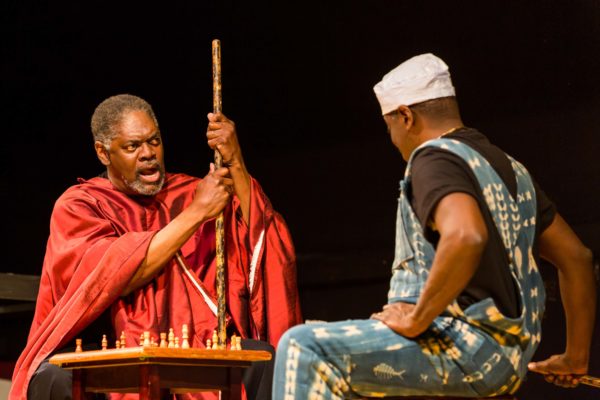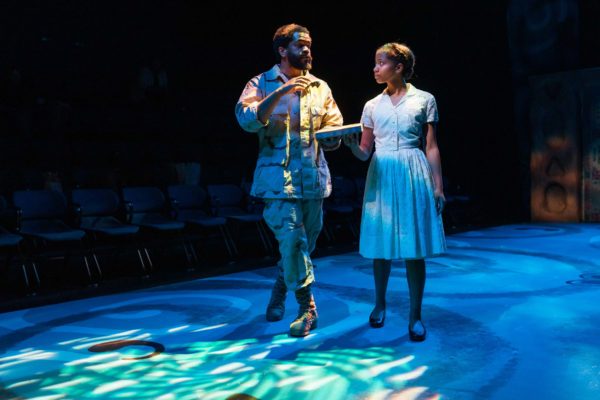Theater Review: “black odyssey boston” — An Electrifying Epic Journey
By Kamela Dolinova
black odyssey boston is a fearless, funny, and fraught reimagining of Homer’s Odyssey as the story of the African-American diasporic experience.
black odyssey boston by Marcus Gardley. Directed by Benny Sato Ambush. A co-production by The Front Porch Arts Collective & Underground Railway Theater at the Central Square Theatre, Cambridge, MA, through May 19.

Johnny Lee Davenport (Great Grand Daddy Deus) and Regie Gibson (Paw Sidin) in “black odyssey boston.” Photo: Maggie Hall.
It is a notion at least as old as the Bible that there is nothing new under the sun, which suggests that the greatest stories have already been told a thousand times over. What great luck for us, then, that the Front Porch Arts Collective has chosen to transform one of the oldest stories in the Western canon into the most beautiful story you’ve never heard.
black odyssey boston, co-presented by the Underground Railway Theatre, is a fearless, funny, and fraught reimagining of Homer’s Odyssey as the story of the African-American diasporic experience. The result is as electrifying as it is important: I have never seen anything like it in a Boston theater.
The evening begins by fusing the storytelling traditions of Ancient Greece and West African griots with a single drummer (Akili Jamal James) taking the stage, moving slowly from stillness into rhythm and breath as if creating the world through sound. He eventually begins to sing. As the song rises, other cast members join him, taking their places in a solemn ritual dance. The music is African to start, then snatches of American spirituals enter, and out of the resulting joy and yearning the ensemble forms a Greek chorus, introducing the gods and mortals who will populate our epic. In only a few moments, the troupe effortlessly sets the scene for our journey – and spellbinds in the process.
Among the production’s many impressive strengths is how true it stays to Homer’s plot and structure while continually revealing new possibilities in the traditional narrative. In the first scene, wily sea god Paw Sidin (Regie Gibson) seeks the life of Ulysses Lincoln (Brandon G. Green) for the crime of killing his son. To win his vengeance, he plays chess against Great Grand Daddy Deus (Johnny Lee Davenport). Predictably (this is Greek mythology), the game becomes all too real as the gods descend below to interfere with human lives — Gibson doubles as every policeman, suitor, and naval officer who thwart Ulysses. In response to Paw Sidin’s fury, Deus gives his blessing to his daughter Athena, who takes on mortal shape as Great Aunt Tina (Carolyn Saxon). She intervenes in Ulysses’ fate by helping his beloved Nella Pell (Elle Borders) endure his long absence with sufficient faith and patience.
So far, so Homer. But this update goes far beyond clever name changes. Our Ulysses is a young kid from the projects in Roxbury; his beloved Nella is pregnant when they marry. Ulysses joins the service in order to secure their future. He doesn’t anticipate 9/11, however, and is then caught up in the war in Afghanistan. After killing a young civilian amid the deadly confusion of war, he is racked with guilt. On the ship returning home, he is swept by a rogue wave into the sea, and his body is lost.
Great Aunt Tina arrives just as Nella is absorbing the news of her husband’s death; she goes on to serve as midwife, doula, nanny, and matron in Nella’s broken household. Thus begins Ulysses’ — and Nella’s — long trial. Sixteen years pass, and the grown child Malachi (Hubens “Bobby” Cius, who also plays the dead cyclops Poly’famous as an Afghani boy with an eyepatch) appears, struggling with all the modern pains of being young, male, and Black in America. Fiercely smart and rebellious — though lacking a father figure — he bucks under Nella’s attempt at control.
Meanwhile, Ulysses floats on a raft in a dream sea, washing up at last on the top floor of a nearly-submerged house. Sheltering on the structure’s roof is a family — father, mother, and daughter — who are convinced that they are living in the End Times and this is the Flood. When the family tells the wanderer that the year is 1968, we see that this version of the tale has added a new element: Ulysses is not just stuck in space but in time. His odyssey is a wild tumble through history, on the hunt for a home he’s not even sure exists.
This was the scene where the complexity of the retelling drew me in irrevocably. All the layers of the narrative begin to rush together, as if drawn there by a whirlpool. In minutes, we feel ourselves in New Orleans after Katrina, in Selma after MLK’s death, with the Scottsboro Boys in Alabama and Emmett Till in Mississippi, and in so many other places in African American history at once. The mind reels and the heart shatters. This endangered family, trapped on a roof with the water rising, waiting for rescue that will never come, is every Black American family ever racked with loss and injustice. And yet, it turns out, it is a very specific one as well. (No spoilers.)
It is here, too, that the story turns backward. Ulysses takes the little girl, Benevolence Naussica Sabine (the magnificent high school sophomore Journey Ade-King) with him to safety; she serves as his sole audience for the stories of his adventures thus far. Their journey by raft up the Mississippi cannot help but invoke Huckleberry Finn, as the child leads the man toward freedom with humor and grace.
The familiar trials of Odysseus are equally hilarious and moving: the witch Circe (Ramona Lisa Alexander) raps a rhapsody of soul food and sex that would seduce any weary traveler. She had the audience blushing amid their howls of laughter. Super Fly Tireseus (played with dotty aplomb by Davenport) is a blind seer who sits on a low-rider, spewing jive-talk and sporting a huge Afro. The Sirens call to Ulysses with the dulcet tones of Diana Ross, Tina Turner, and James Brown — vocals that nearly bring the house down.

Brandon G. Green (Ulysses Lincoln) and Journey-Ade King (Benevolence Nausicca Sabine) in “black odyssey boston.” Photo: Maggie Hall.
When our heroes finally reach the shores of Boston, the mythic spell is broken. Instead they must face the realities of police violence, poverty, broken families, the school-to-prison pipeline, and every other horror that afflicts contemporary Black America. Ulysses, nearly paralyzed by history and his guilt for the blood on his own hands, cannot return home until he has freed his mind from its self-imposed prison. The journey for this Black hero means he must venture into own past: to link with his ancestors, yes, but also to tease apart what was done to him from what he himself has done. Only by accepting responsibility for the life he took can Ulysses overcome the oppression he has been running from his entire life. Only when he breaks free from the cycle of revenge and recrimination that fuels Poseidon’s rage — that sea which is both cradle of his ancestors and stormy abyss of revenge — can he truly come home and face both his wife and his own son, who could so easily have been the boy he killed.
The production soars, at least in part, thanks to the unity of its design, which all but disappears into the spell cast by the storytelling. The sound by Dewey Dellay, mixed with live music coordinated by Allyssa Jones and anchored by drummer James, is the production’s strongest element, while the simple sets and lighting by Jon Savage and Aja M. Jackson create an unobtrusive, watery canvas for the performers to paint. Nadine Grant’s beautiful costumes array the cast in glory, from young Nausicca’s ‘60s church dress (and hair bows) to Great Aunt Tina’s on-point outfits and Circe’s seductive spangles and silks.
But it is the acting, Benny Sato Ambush’s agile direction, and the ensemble’s chemistry that do justice to the script’s poetic language. Dramatist Marcus Gardley has come up with an ecstatic verse that, at times, out-Homers Homer. Green and Borders (reportedly partners in real life), pulse with gravity, faith, pain, and love. Their relationship — so central to the original epic and to this version — anchors the piece amid the swirling chaos of the narrative. Saxon, as the indomitable Athena / Aunt Tina, rules the stage every time she sets foot on it. And the ensemble, especially the mercurial Kai Thomani Tshikosi, command the warp and weft of the piece with the confidence of Penelope’s loom.
In black odyssey boston, the strands of Black history swirl across the Middle Passage and up the Mississippi along with Ulysses’ raft. This Ulysses’ story is not just about finding his way home through the storm no matter the cost, but about learning what he needs to know about his people’s past so that he may create a future. This is a rare history play in which revelations engender individual and collective redemption, a grace that is dramatized in astounding and moving ways. Those who care about the future of the stage in Boston should see this show, if only to support a thrilling new theater company that succeeds splendidly in reinvigorating an ancient epic.
Kamela Dolinova is a writer, actor, director, healer, and person with too many jobs. She loves the community and little theatre scenes in Boston, and has recently enjoyed working with Flat Earth Theatre, Theatre@First, and Maiden Phoenix Theatre Company. She also blogs at Power In Your Hands and at Medium.
Tagged: Benny Sato Ambush, Front Porch Arts Collective, Marcus Gardley, black odyssey boston

When is black odyssey boston coming to LA? I’m ready to fly to Boston to see it if it’s not coming our way after this great review! Sounds like an outstanding play and an outstanding review. Well done, all around!